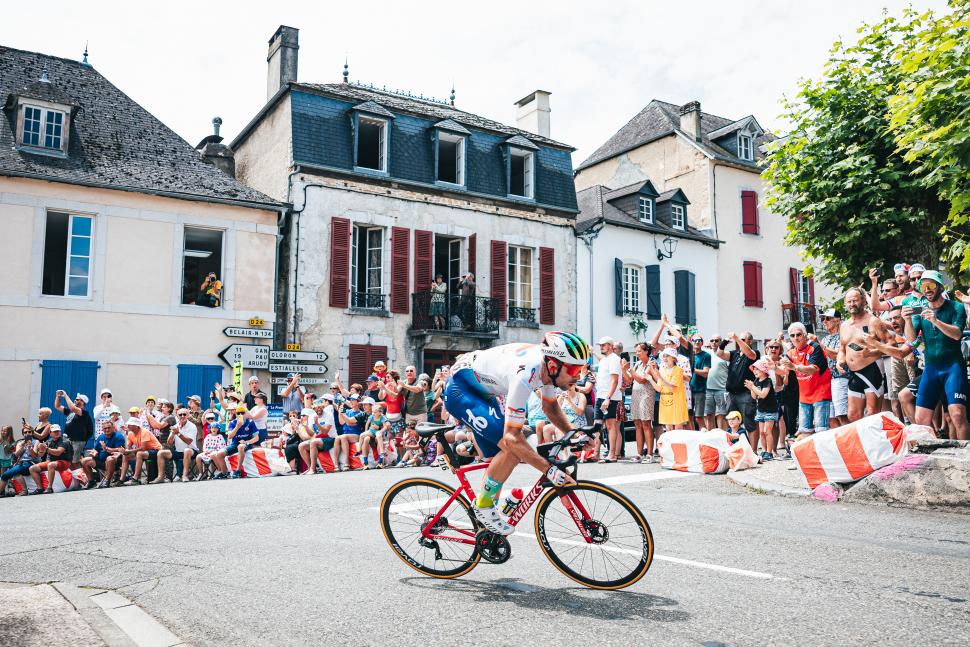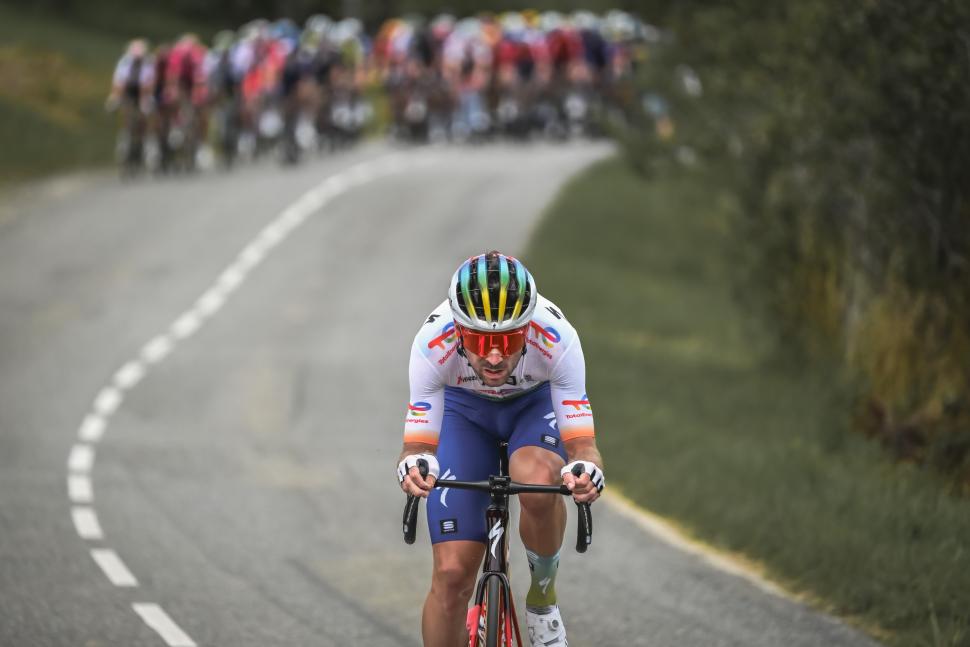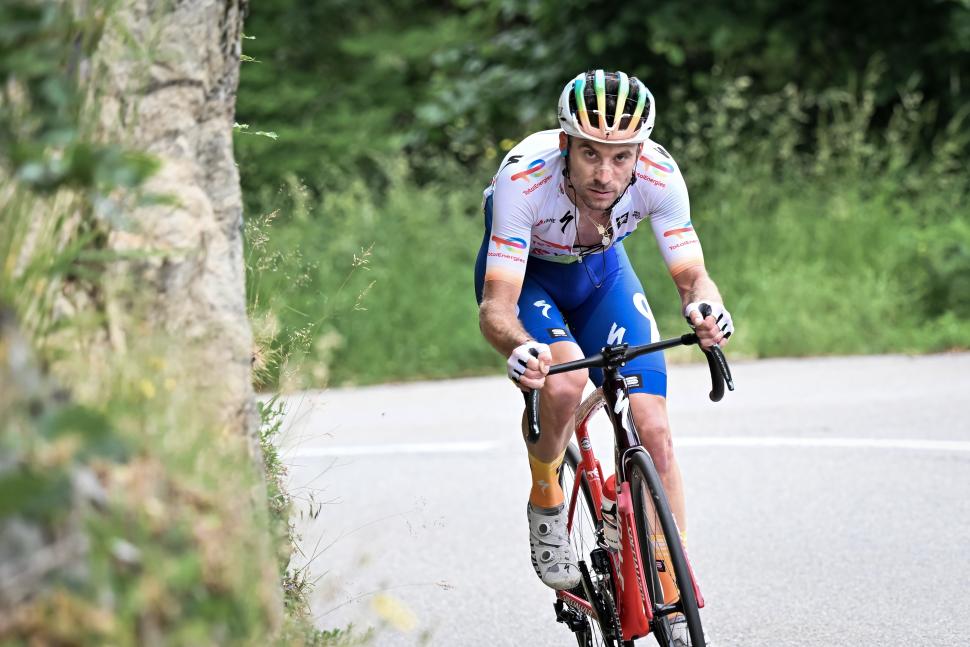- News
- Reviews
- Bikes
- Components
- Bar tape & grips
- Bottom brackets
- Brake & gear cables
- Brake & STI levers
- Brake pads & spares
- Brakes
- Cassettes & freewheels
- Chains
- Chainsets & chainrings
- Derailleurs - front
- Derailleurs - rear
- Forks
- Gear levers & shifters
- Groupsets
- Handlebars & extensions
- Headsets
- Hubs
- Inner tubes
- Pedals
- Quick releases & skewers
- Saddles
- Seatposts
- Stems
- Wheels
- Tyres
- Tubeless valves
- Accessories
- Accessories - misc
- Computer mounts
- Bags
- Bar ends
- Bike bags & cases
- Bottle cages
- Bottles
- Cameras
- Car racks
- Child seats
- Computers
- Glasses
- GPS units
- Helmets
- Lights - front
- Lights - rear
- Lights - sets
- Locks
- Mirrors
- Mudguards
- Racks
- Pumps & CO2 inflators
- Puncture kits
- Reflectives
- Smart watches
- Stands and racks
- Trailers
- Clothing
- Health, fitness and nutrition
- Tools and workshop
- Miscellaneous
- Buyers Guides
- Features
- Forum
- Recommends
- Podcast
news
 Pierre Latour, stage 5 of the 2023 Tour de France (Alex Whitehead/SWpix.com)
Pierre Latour, stage 5 of the 2023 Tour de France (Alex Whitehead/SWpix.com)“It’s like I’m going into the void with no control”: Tour de France pro says he feels “completely paralysed” and “scared to death” on descents
As the Tour de France heads into the Alps, and up the fearsome slopes of the Col de Joux Plane, for a potentially decisive day in the battle for the yellow jersey, one rider in particular won’t be looking forward to the fast, technical, and notorious descent to today’s finish in Morzine.
In a revealing interview with Le Parisien, French star Pierre Latour admitted that being “scared to death going downhill is my life” – and that the now-ubiquitous use of disc brakes in the pro peloton has made descending in races even more dangerous.
TotalEnergies rider Latour, who won the white young rider’s jersey at the 2018 Tour de France and finished second on Sunday’s summit finish on the Puy de Dôme, also revealed that he has tried a number of treatments, including hypnosis, to cure his seemingly chronic fear of descending, but that the “slightest annoyance downhill” still makes “everything explode in my head”.
“I can’t unlock a form of fear on the descents. Already, it makes me go to the back of the peloton and then forces me to make useless efforts to come back. Result, I race all the time upside down. It’s all in the head. I know it, but it’s stronger than me,” he told Le Parisien following his stint in the breakaway on yesterday’s stage to Grand Colombier.
Latour attacks on stage five of this year’s Tour (A.S.O./Pauline Ballet)
The 29-year-old’s 2022 season was derailed by a series of crashes at the Tour of the Basque Country and the Mercan’Tour Classic Alpes-Maritimes, which may have contributed to his current debilitating approach to descending, though Latour believes his fear stems from an earlier fall.
“There was of course a big crash during the Tour of Oman in 2019 which cost me two fractures, of the radius and the scaphoid in my left hand. But there were others,” he says. “And above all, sometimes on a descent, if there is a bit of rain, my wheel moves. And there, it’s as if everything is extinguished.
“I’m scared because I have the impression that I’m going into the void with no control over anything. Like an air pocket in an airplane. And it’s over, the descent is stuck. I tense up and know that I have just fallen back into this fear. It’s as if, in my head, there is no more ground under my wheels.”
He continued: “It’s a vicious circle. I brake while the others continue to ride. So the others pass me by, brushing against me very close. As a result, it scares me even more, feeling like planes are passing me. I feel their drag of air and I tense up even more. I am full of tension which slows me down.
“It must be understood that I then have the impression of having forearms that weigh fifty kilos each. I am completely paralysed.”
> Swiss pro cyclist Gino Mäder dies after horrific Tour de Suisse crash
The former Vuelta a España stage winner also revealed that he has tried sophrology, psychoanalysis, mental preparation, and hypnosis in a bid to cure his descending yips, but to no avail.
“Each time, it makes me feel good for a while. But at the slightest annoyance downhill, everything explodes in my head. Like an alcoholic enjoying a drink. And it’s like I'm starting from scratch,” he says.
“And I’m not talking about a new fall but just a small slip that seems harmless. Except that it makes everything blow up in my head. And everything blocks. This year for example, everything was going well until the Tour du Jura where a small fall put me back in my s***.
“I decided after the Tour that I’m going to try a new thing: to go on a motorcycle circuit to see if I can take the lines well and get used to the speed in the curves.”
(A.S.O./Billy Ceusters)
Latour said he has been coping with the major downhill sections on this year’s Tour, such as those off the top of the Col du Tourmalet and Col d’Aspin in the Pyrenees, by staying well to the back of the group and carefully navigating the corners.
“I made my cushy descent, as I wanted. And I take the curves correctly,” he says. “Whereas if I paralyse, I make choppy turns which block me even more. I’m idling and it sucks.
“If I see a trace of water like a piece of stream crossing the road, I put on the brakes when it’s the worst thing to do. And there, it is useless to reassure me, I am in no condition to listen. But sometimes I look for the wheel of guys I trust like my teammate Anthony Turgis or [Lidl-Trek’s] Tony Gallopin.
“They reassure me because I know they know how to descend without taking too many risks. We can say that I am the handicapped person on the descent and the guy who loses time at the top of the bumps. Scared to death downhill is my life.”
Latour also acknowledged that the death of Swiss rider Gino Mäder, who was killed after crashing on a fast, technical descent at last month’s Tour de Suisse, has also impacted his approach to racing downhill, as well as his understanding of the concept of ‘taking risks’ and the pressure placed on riders during races.
“I knew that you could hurt yourself a lot on a descent and I proved it several times. But then I realised that you could die. It’s different,” he says. “Gino, he spoke good French and we talked sometimes. And suddenly, he left. I felt a form of mourning. I know I can sound like a d*** saying that. But my life is worth more than trying to finish 50th instead of 100th.
“I’ve known races where groups have dropped down like idiots while guys had fallen. At some point, you have to ask yourself the right questions. I want to speed up if I’m in front or if I have to get in on time. But between the two, we must not do anything. And there are some who take it as a video game.”
When asked if modern riders take too many risks, Latour replied: “I’m in no position to say that when I don’t take enough!
“But disc brakes increase the danger. Before, we had progressive braking. Now, we’re all at once, so we’re delaying the braking as much as possible.
“Look at my face downhill, it shows how I feel… But others are as scared as me but don’t want to admit it. I imagine they don’t want to be yelled at by their bosses.”
After obtaining a PhD, lecturing, and hosting a history podcast at Queen’s University Belfast, Ryan joined road.cc in December 2021 and since then has kept the site’s readers and listeners informed and enthralled (well at least occasionally) on news, the live blog, and the road.cc Podcast. After boarding a wrong bus at the world championships and ruining a good pair of jeans at the cyclocross, he now serves as road.cc’s senior news writer. Before his foray into cycling journalism, he wallowed in the equally pitiless world of academia, where he wrote a book about Victorian politics and droned on about cycling and bikes to classes of bored students (while taking every chance he could get to talk about cycling in print or on the radio). He can be found riding his bike very slowly around the narrow, scenic country lanes of Co. Down.
Latest Comments
- Festus 1 sec ago
One thing that bothers me is the use of antidepressant med and driving, it never gets picked up by police. Most of these types of medicines state...
- Rendel Harris 20 min 26 sec ago
Such as, for example, saying: "It’s made from two types of fabric: super-loud yellow (orange is also available as a colour option, as is pink in...
- Mr Blackbird 25 min 26 sec ago
Possibly, but I think there will still be a time delay between receiving a warning and looking and the brain processing the image.I guess cycling...
- chrisonabike 2 hours 3 sec ago
Indeed - but again these are perhaps questions we should keep asking. Even if the immediate answer is "well we are where we are" or "how on earth...
- Surreyrider 2 hours 53 min ago
Specialized aren't that American. Merida owns something like 49%.
- wtjs 3 hours 47 min ago
Then smash bad driving behaviour very hard...
- David9694 8 hours 24 min ago
Calls for Oxfordshire transport chief to resign blocked...


Add new comment
13 comments
Descending-skills specific training would be good. So:
- Just finding a suitable mountain road (fast, twisty, quiet) and doing it again and again in the company of a good descender. Perhaps wearing motorcycle leathers, gloves, back protector and helmet initially.
- Doing MTB downhill, again and again, with a good descender for company. Again, with lots of protective equipment.
- Motorcycle track days could help too - but if he doesn't already ride motorbikes, it'd take some time to build up the more basic motorbike skills needed, before he could get much out of track sessions in terms of learning about cornering speed.
Worth noting, a bicycle can often corner faster than motorbikes, in road conditions. Motorbikes can use their massive brakes and power to approach faster and slingshot out, but mid-corner a bicycle is often faster - just cause of the lack of weight. But riding a motorbike on a track you can experience more cornering forces than on a bike on the road. Whether a bike on a wide track you could get the same or better cornering feel, I don't know - only ridden motorbikes on tracks, but that did help with bicycle cornering.
One of the most important thing is to be sufficiently relaxed on the bike. Obviously, not too relaxed, you have to maintain control, but being stiff on the bike is terrible for handling. To descend well, your body should be relaxed enough to let the bike naturally move around bumps and lumps, while providing a damping function and retaining control. Sitting all rigid fails at all of that.
Gianni Bugno claimed that music therapy, specifically listening to Mozart while training, helped him overcome his fear of racing down descents, at least sufficiently to win the 1990 Giro. But, as I recall, medical treatment for vertigo also had something to do with it.
Hopefully Pierre Latour finds his own cure, unique to him. And that he doesn't get branded a luddite by the disc-brake zealots, as Chris Froome has been. That the pros would push the envelope for how late they can brake into corners was inevitable, and I can see how it could make things worse for an unconfident descender like him.
In terms of discs vs rims, what he is actually saying is that disc brakes are significantly better brakes, but that as a result riders are able/willing to take greater risks.
It seems another point in favour of my long held view that disc brakes are definitely better for your average rider, but the advantages are less clear for the pros.
Maybe, and not being facetious here, a few laps of a closed circuit on the back of a sports motorcycle, riden by someone who knows what they are doing will give some perspective on high speed cornering?
But I totally agree that out on the road and certainly in a race scenario, the fastest rider will be both skilled and prepared to take more risks. The extra control and power of disk brakes allows those riders to push that envelope, whereas for most of us without the same race motivation, they increase margin of safety and comfort.
I don't think you'll learn much riding pillion on motorbike tbh. Ideally, he should practice cornering himself - on a bike or motorbike, somewhere suitable.
Interesting that a pro rider effectively says the use of disc brakes has made road cycling more dangerous. It's been mentioned plenty of times before that a disc brake may stop the wheel quicker but the contact patch between tyre and road is still the weak link and a few mm wider tyres won't make much difference at high speed descents.
Ever since I switched to discs I have brakes that give me better modulation and stopping power. Disc brakes are much better on descents than rim brakes - that's just a fact. Obviously the pro peloton will always use a technical advantage to go faster rather than be safer and I think that's what's psyching out our French pro.
I have an Emonda with disc brakes and that is excellent up and down hill. But I'm never going down as fast as the pros. And that's what I'm talking about. People want what the pros ride. And this is widely acknowledged when the UCI bans things like sitting on the top tube or puppy paws on the handlebars as it is they realise it's copied by fans. There was nothing wrong with rim brakes in pro cycling. It was a marketing decision by manufacturers. But what happens if the pros decide they are bringing an element of danger? When riders are dying in events the riders union can carry a lot of weight if they feel their safety isn't been looked after. It's unlikely discs would disappear but if we get more incidents of serious injury or fatalities that can to attibuted to them it could happen.
No it won't happen. Discs aren't a scam by Big Bike, they're just a step in the technological evolution of bikes. What can happen to improve pro safety is some roadside protection on descents, which if I understood correctly was actually in place today on some points on the last descent.
Totally correct. With rim brakes I can only brake in the drops. With the extra power and modulation of discs it's easy to brake controllably and hard in almost any handlebar position.
I think brakes that work in the wet are probably a good thing.
What a profoundly open and honest account of his experiences. That was wonderful and enlightening to read. I wish I could read the original French article!
Pierre, you may not be brave on descents, but your bravery sharing this for the rest of us is second to none!
I enjoy descents but I'm not doing it at pro speeds. Pidcock's descents are terrifying to watch and the risks are real. A long time ago, the notorious Joux Plane descent into Morzine did for me. Not because I got a corner wrong, instead at high speed I encountered a line of sharp gravel washed across the road by a storm the previous day. Stupid narrow 90s clincher tyres flatted front and rear instantly and I slid across the road and slammed into a ditch. The Sapeurs Pompiers carted me off the mountain. Was concussed for a few days and bike was greatly damaged.
Hope nothing like that happens today although they've already had a massive crash out of nothing.